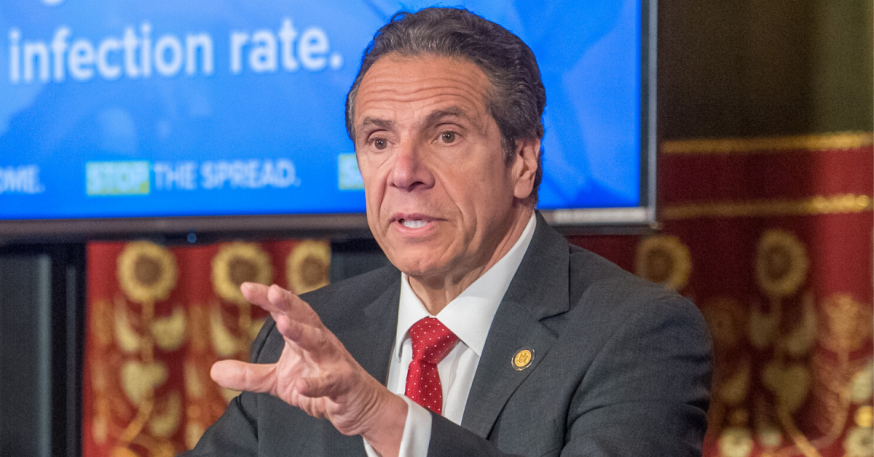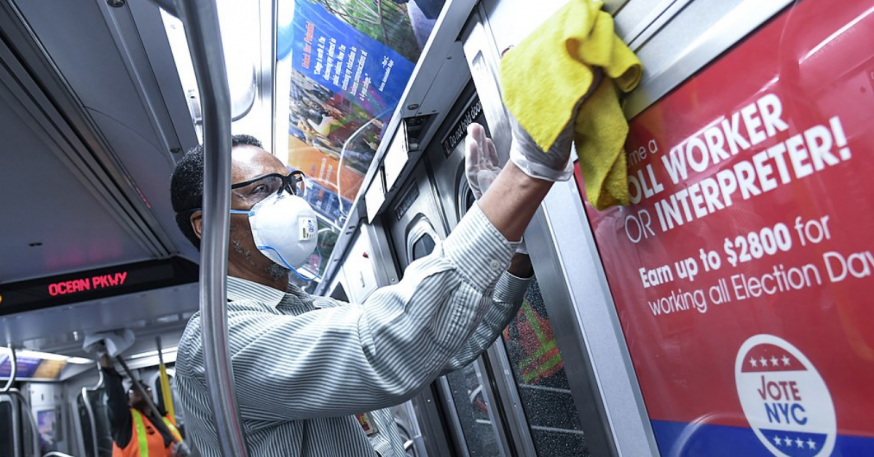
(Darren McGee- Office of Governor Andrew M. Cuomo)
April 30, 2020 By Michael Dorgan
Governor Andrew Cuomo is shutting the New York subway system for four hours each night for “aggressive” coronavirus cleanings.
The system – which has operated on a 24/7 basis throughout the pandemic – will stop for nightly closures so that trains can be cleaned and sanitized, the governor said at a press briefing Thursday.
Service will cease from 1 a.m. to 5 a.m. each night beginning on May 6. All customers will be required to leave the trains and the stations during that time.
The announcement comes after much outcry about the influx of homeless people onto the trains. Critics say the trains are filthy and unsafe, off-putting to riders.

Disinfection of New York City Subway cars against coronavirus(Wikipedia)
Under the new cleaning plan, the MTA will disinfect thousands of subway cars and buses each night.
The agency will also roll out new and innovative cleaning solutions including ultraviolet, antimicrobial and electrostatic disinfectants.
“It’s a massive undertaking we have to do,” Cuomo said. “You have to disinfect every place a hand could touch. Every handrail, pole, door…and the stations.”
Civic groups and elected officials have been critical of the conditions for weeks, arguing that they have been putting essential workers at risk.
On April 15, three Queens elected officials, including Council Members Bob Holden and Peter Koo, called for the governor and mayor to shut the system down for a week for a deep cleaning– and then upon reopening close it for nightly cleanings.
They argued that the transit system was a contributor to the spread of COVID-19.
“We were ridiculed in statements from the MTA and both the governor and mayor’s offices who said our proposals were not possible, with the MTA actually calling the idea ‘dumb,’” Holden said Thursday.
“Now they are finally implementing some of these measures that we suggested two weeks ago, so imagine how many more lives could have been saved during that time.”
My colleagues and I proposed in an April 15 letter to Governor Cuomo and Mayor de Blasio that the MTA should shut down daily from 12 a.m. to 5 a.m., and provide free rides to essential workers using for-hire vehicles and other services. (1/3) https://t.co/YqNDpqxZ4X
— Robert Holden (@BobHoldenNYC) April 30, 2020
The MTA will provide service to health care workers, first responders and other essential personnel while the trains are shut down each night for cleaning.
The agency will utilize buses, vans and for-hire vehicles to transport these workers to their destinations for free.
3 Comments

It’s about time! Though it should NOT take a pandemic to clean the subways or buses. They are always filthy! Including the machines to buy the subway cards.
Irs the people that dirty the trains and stations, people urinating and spitting, littering. NYPD / MTA police should enforce the rules & fine the offenders. Have those offenders do community service and Clean up.
But unfortunately some “people” will find that offensive and protest.
Glad to hear that Governor Cuomo wants the MTA to insure all trains are thoroughly cleaned daily. I suggested this weeks ago. Everyone has known for decades that the subway, bus, commuter rail and ferries are a Petri dish for catching a cold, the flu or other communicable diseases. The rise of a growing homeless population, who ride our subways and live at stations have made matters worse. They clearly have little ability to maintain personal hygiene. The previous announcement by MTA Chairman Pat Foye in response to the threat of the corona virus growing was disappointing. His commitment to have transit workers deep clean the entire system using an “enhanced daily cleaning procedure,” or scrub strategy, including bleach and hospital grade disinfectant should have been the norm for years. The same is true for sanitizing “commonly touched surfaces” at stations including turnstiles, exit gates, platform floors, bathrooms, Metro Card vending machines and benches on a daily basis. Deep cleaning subway cars once every 72 hours during this crises was always insufficient. Between homeless on board and rush hour standing room only crowds, they need to be thoroughly cleaned on a 24 hour basis. The odds increase for spreading a communicable disease when you are trapped on a crowded bus or subway for long periods of time. Millions of New Yorkers ride the subway, bus or commuter rail. They should not have to wait once every three days for a complete cleaning of vehicles.
It should not have taken the potential spread of the corona virus for the MTA to properly clean equipment and stations. Safety and security of the riding public should always be the number one priority.
(Larry Penner — transportation advocate, historian and writer who previously worked 31 years for the Federal Transit Administration Region 2 New York Office. This included the development, review, approval and oversight for billions in capital projects and programs for the MTA, NYC Transit, Long Island Rail Road, Metro North Rail Road MTA Bus, New Jersey Transit along with 30 other transit agencies in NY & NJ).